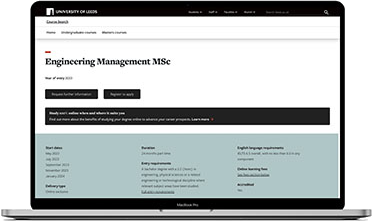The School of Electronic and Electrical Engineering: Pioneers in Global Engineering Research
Engineering ManagementThe School of Electronic and Electrical Engineering brings together leading scientists and engineers who are tackling global challenges and making a real-world impact in the engineering industry through diverse research which spans from renewable energy and communications networks to medical electronics and healthcare.
Read on to learn more about the school, its pioneering engineering research, academic expertise and more.
Learn more about our Engineering Management courseWhat is the School of Electronic and Electrical Engineering?
The School of Electronic and Electrical Engineering is a department at the University of Leeds, with a specialist focus on engineering for electronics in a variety of areas including:
- Microwave, semiconductor, and terahertz technologies.
- Bio-nano and quantum technologies.
- Robotics.
- Ultrasound and medical imaging.
- Energy-efficient green communications networks.
- Wireless and mobile communications.
- Power electronic systems.
- Renewable energy.
It delivers pioneering research on a global scale and facilitates expert courses such as the online Engineering Management MSc in collaboration with three other engineering schools at Leeds.
The school is part of the Faculty of Engineering and Physical Sciences, which brings together experts across other areas like civil engineering, chemical and process engineering, and mechanical engineering to generate knowledge sharing and collaboration across a wide range of disciplines.
What engineering research projects are currently underway at the School of Electronic and Electrical Engineering?
With over 100 years of history and a unique infrastructure, the school offers an outstanding research impact to the global engineering industry.
Recently, researchers and academics at the University of Leeds were awarded £2 million of funding to set up the Communications Hub for Empowering Distributed Cloud Computing Applications and Research (CHEDDAR) that can drive innovation in cloud technologies.
The primary goals of the project are to:
- Develop innovative collaboration methods to engage pockets of excellence around the UK.
- Build a cohesive research ecosystem that nurtures early career researchers and new ideas.
- Inform the design of new communication surfaces that cater to emerging computing capabilities (such as neuromorphic, quantum, molecular), key infrastructures (such as energy grids and transport), and emerging end-user applications (such as autonomy).
- Create integrated design of hierarchical connected human-machine systems that promote secure learning and knowledge distribution, resilience, sustainable operations, trust between human and machine reasoning, and accessibility in terms of diversity and inclusion.
- Co-develop regional case studies that reflect the diverse challenges faced by different industries and societies across the UK.
Working in collaboration with other universities, research from the new hub will help secure the future of cloud communications systems by making them safe, trustworthy, and sustainable.
“CHEDDAR will allow us to not only increase the efficiency of current deployments but also allow us to reduce the energy footprint of future deployments while supporting new services. It also aims to contribute towards the shortfall of digital skills and bridge the digital divide by developing human-centric design principles for future technologies”.
Who does the School of Electronic and Electrical Engineering collaborate with?
The school has collaborated with academic institutions and major international electronics and communication companies around the world, whilst also working extensively with other schools across the University of Leeds, and holding strong links with the Bragg Centre for Materials Research, Energy Leeds and Robotics at Leeds.
Insights from these collaborative efforts closely inform the content of courses delivered by the School of Electronic and Electrical Engineering at the University of Leeds, including the online Engineering Management Masters, ensuring that it aligns with the changing engineering landscape and latest trends in electronic engineering.
What are the latest developments at the School of Electronic and Electrical Engineering?
To keep up to date with all the latest developments at the School of Electronic and Electrical Engineering, visit the website or follow the @LeedsUniEng Twitter feed.
Study an online Engineering Management MSc with the University of Leeds
Our Engineering Management Masters is delivered online by the University of Leeds. With a 100% online method of study, you can join from anywhere in the world, benefitting from the world-class academics, research initiatives and strategic collaborations on offer.
The course is a result of an in-depth collaboration between high-profile academics from four leading engineering schools. It covers an array of engineering specialisations including electronic and electrical engineering, chemical and process engineering, civil engineering, and mechanical engineering.
This course is ideal for you if you have:
- A firm understanding of electronic engineering or the broader engineering industry.
- The drive to become a Senior Engineer or secure other top engineering management jobs.
- A good Wi-Fi connection so you can access our state-of-the-art virtual learning platform.
Discover new possibilities to take your career further with an online Engineering Management Masters.

Did you enjoy this blog? Here’s some related engineering content that you may be interested in:

Want to learn more about our online Engineering Management course?
Check out the course content and how to apply.

